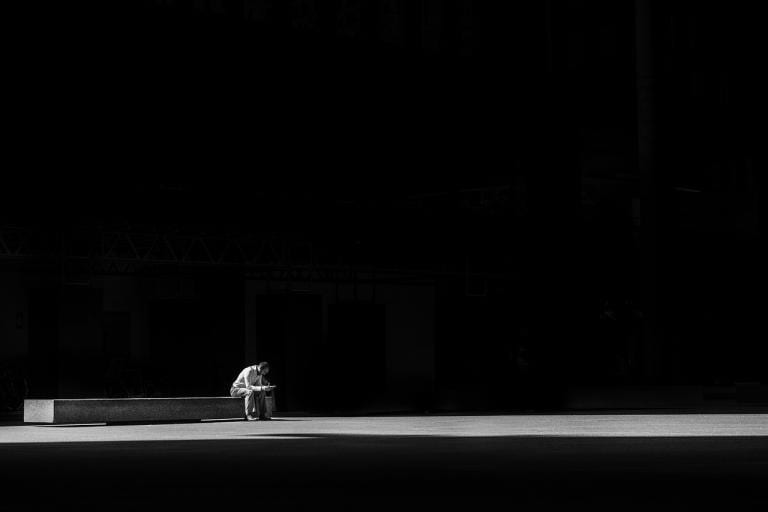One of my correspondents recently asked me about the problem of suffering, specifically as it relates to people who aren’t capable of understanding or deriving meaning from their own suffering – infants or people with mental incapacities, for example.
A complete resolution of this question would involve stepping so far outside of any possible human paradigm that it’s laughable to think we will ever understand if in full. However, I do have some observations about suffering and its place in the universe that might, perhaps, point us towards an answer.
Obviously, we can’t get to the problem of the pain of innocents without first addressing the more general problem of suffering as such, so we’ll start with that.
Usually when we’re looking at the problem of pain, we’re looking at it from a human perspective: “If God is all powerful,” we think, “then surely He could prevent this.“ In our own lives, the prevention of suffering – especially of other people’s suffering – forms the basis of most moral action. If someone gave us the power to wave a magic wand over a child with cancer, or an abused infant, of course we would wave the wand. Anything less would imply a profound and disturbing lack of compassion.
It seems, then, that there’s a serious problem with a God who, having the power to create any kind of world that He wanted to, produced one in which innocents would be subjected to suffering.
What happens, though, if we turn the problem upside-down? Or rather, if we turn it right-side-up. What if we ask the question from a Divine perspective: how would you go about creating the world-without-suffering? Is it possible? What would it look like?
My own sense is that the dream of world in which innocence never suffers falls into the same category as the old paradox about God creating a boulder so heavy that He cannot move it. The paradox is based on a false premise – namely that omnipotence includes the ability to do things that are logically impossible.
So let’s do the thought experiment. Let’s say that you want to create a world in which there is no suffering. I can see two approaches that might work. First, you can create a world in which there are no beings that have moral freedom. Simple. The only problem is that moral autonomy is a precondition for any authentic form of love, so in order to eliminate suffering you must (in this case) create an inferior world – basically, you have to introduce a huge foundational privation into the system in order to prevent a host of lesser privations.
A second possibility is to try to have moral free will without suffering. This would involve creating beings that are capable of doing evil but that don’t experience evil as evil. To me, this seems like it’s probably incoherent. Think, for example, of the angels: the idea is that these are creatures without bodies, they don’t experience pain or emotional suffering the way that we do, and yet when the angels under the leadership of Lucifer chose to reject God, chose evil, they entered into a permanent and irredeemable state of existential suffering.
Moral freedom is fundamentally concerned with the ability to choose non-existence, to deprive either oneself or others of what it objectively good. If you want to have beings that don’t suffer as a result of their evil choices, you basically have to have beings that cannot value the good. The problem is that a being that cannot value the good also cannot benefit from the good. You can’t have your cake and eat it: in order to derive joy, delight or happiness from the possession of goods (both interior and exterior) you have to experience the loss, or privation, of those goods as evil. This experience of evil is the essence of suffering.
Another possible tack would be to create creatures with free will, but only allow those who choose good in every case to go on existing. The moment that a created being chooses evil it ceases to exist. Simple enough solution. The problem with it is that it basically amounts to choosing the greater evil: rather than supporting, maintaining and upholding the good that still exists within your creature you destroy it entirely. Again, you’re allowing suffering to trump being.
Suffering, then, shouldn’t be understood as evil in itself but rather as a good, healthy, response to the possibility of evil. Suffering allows us the possibility of choosing evil while at the same time guaranteeing our right to existence. Since both freedom and being are high level goods, God’s decision to tolerate evil in order to secure them makes sense in the context of His benevolence.
If you do the thought experiment you find that at each step of the way you have to make a decision: will you eliminate a particular kind of being in order to avoid the possibility of suffering. Put another way, will you allow the risk of privation and non-being to have the final say, to blackmail the creative potentials of reality. Any being that is actually omnibenevolent, and actually omniscient, is going to see beyond the rather parochial human fixation on the experience of pain as the ultimate evil. From a divine perspective, non-existence, non-being, is a much greater evil than existence with suffering, so suffering is therefore tolerable in the service of higher goods.
This gets us as far as “why allow suffering,” but it doesn’t deal with the particular problem of suffering innocents. I would, however, like to offer readers the opportunity to do the thought experiment for themselves – to try to come up with a compelling and coherent vision of a universe in which all possible goods are preserved without allowing for the possibility of pain. Feel free to post your thoughts on that in the com-box – or if you have a blog of your own, go ahead and paste a link.
I’ll cover the particular issue of suffering and innocence next time.
Image credit: pixabay
Stay in touch! Like Catholic Authenticity on Facebook:












